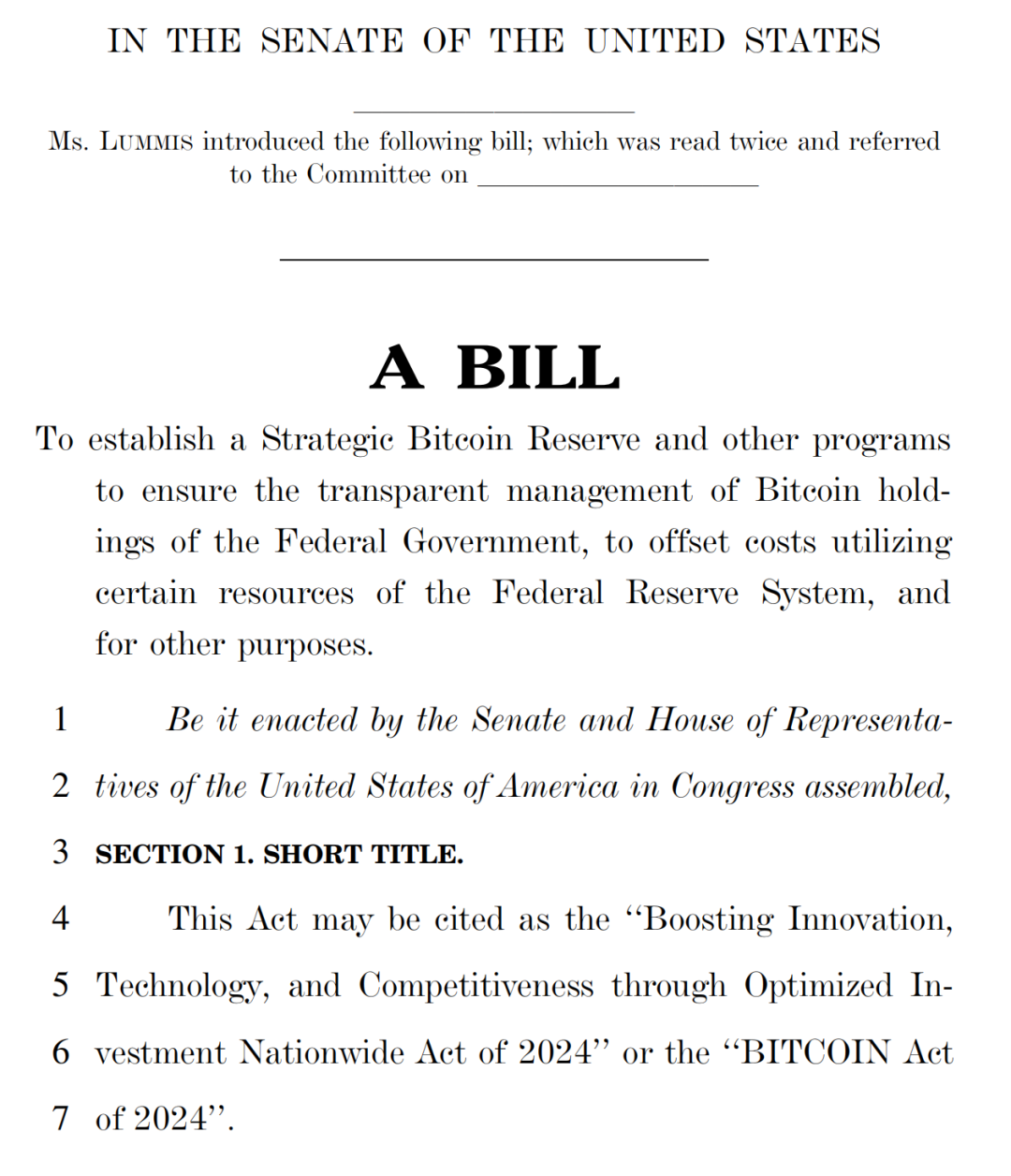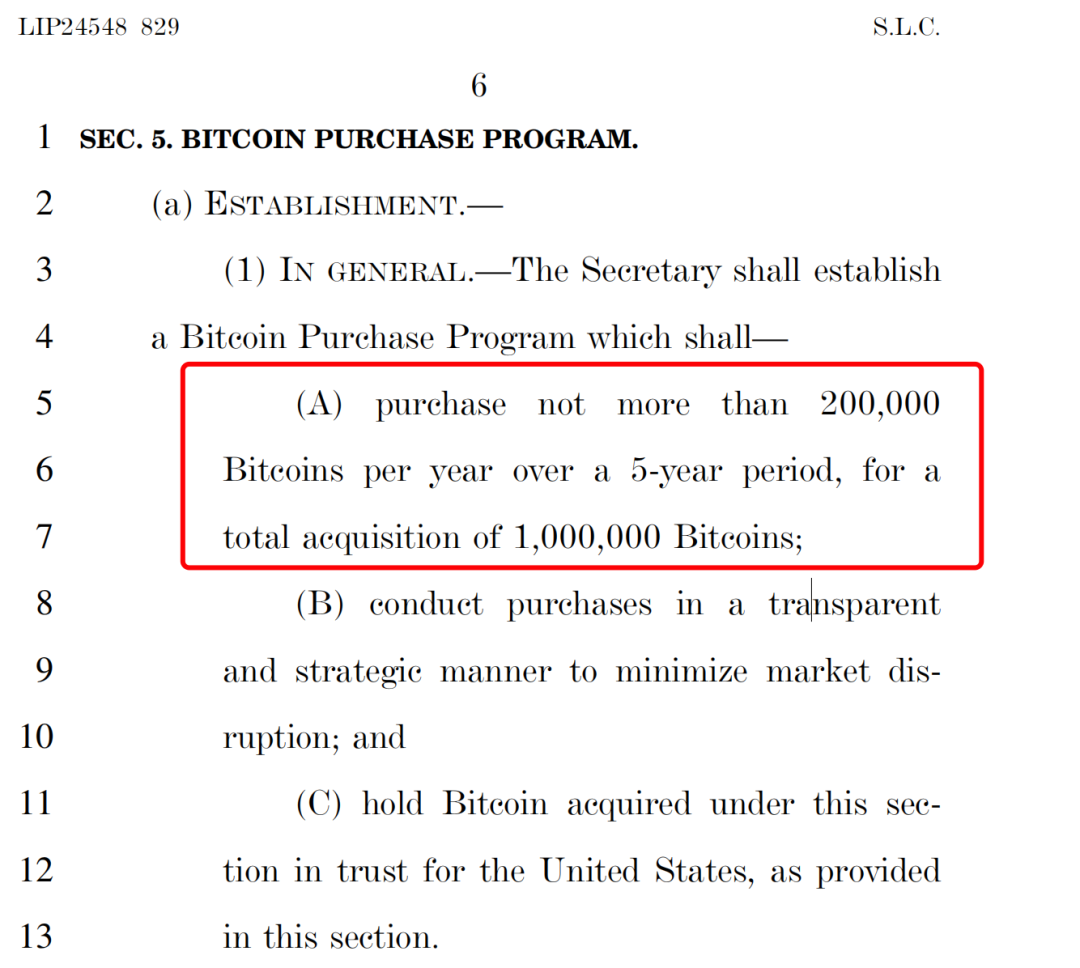As the level of attention to digital assets continues to rise globally, the United States is also actively exploring how to maintain its leading position in this field. Against this background, Senator Cynthia Lummis proposed the "BITCOIN Act of 2024" on July 31. The bill aims to enhance the financial security and leadership of the United States by establishing a national Bitcoin reserve.

I. Contents of the Bill
By incorporating Bitcoin into the national asset reserve, the bill hopes to provide the United States with a tool to combat economic uncertainty and currency instability, enhancing the country's financial resilience. The following is a summary of the bill's contents compiled by Aiying:
1. Bitcoin Purchase Plan
The bill establishes a "Bitcoin Purchase Plan," aiming to purchase up to 200,000 bitcoins annually for five years, totaling 1,000,000 bitcoins. This will account for approximately 5% of the total Bitcoin supply. The purchasing process will be transparent and strategically conducted to minimize market disruption. The goal of this plan is to ensure that the U.S. government can hold a large amount of Bitcoin for the next twenty years, providing a long-term financial hedging tool for the country.

2. Establishment of Secure Storage Facilities
To ensure the secure storage of Bitcoin, the bill requires the establishment of a decentralized network of Bitcoin secure storage facilities. This network will be managed by the U.S. Department of the Treasury and distributed nationwide to enhance the security and resilience of the reserve. Each storage facility will employ state-of-the-art physical and digital security measures to ensure that the Bitcoin reserve is protected from unauthorized access and attacks.
3. Funding Sources for Purchases
The bill proposes using existing Federal Reserve System and Treasury funds to purchase Bitcoin. Specific methods include reevaluating the Federal Reserve's gold certificates to reflect the market value of gold and using the difference to purchase Bitcoin. Additionally, the bill plans to reduce the Federal Reserve banks' free surplus funds and allocate the saved funds to the Bitcoin purchase plan.
4. Holding Period and Usage Rules
According to the bill, the Bitcoin purchased by the government must be held for at least 20 years. During this period, these bitcoins may not be sold, exchanged, or auctioned, except for the purpose of repaying national debt. After the initial holding period, a maximum of 10% of the reserve can be sold every two years. This rule aims to ensure the long-term stability of the Bitcoin reserve while providing some flexibility to address future economic needs.
5. Combating Economic Uncertainty and Currency Instability
By incorporating Bitcoin into the national asset reserve, the bill aims to provide the United States with an effective tool to combat economic uncertainty and currency instability. As a decentralized and limited-supply digital asset, Bitcoin possesses unique functions for hedging against inflation and serving as a safe haven. Holding Bitcoin not only enhances the country's financial resilience but also helps maintain a leading position in global financial innovation, ensuring that the United States remains in a favorable position in future economic competition.
Through these measures, the "BITCOIN Act of 2024" seeks to provide new financial security for the United States in the digital economy era, promoting the modernization and diversification of the national financial system.
II. Current Progress of Various Virtual Currency-Related Proposals in the United States
Each session of Congress typically receives thousands of proposed bills. For the 118th Congress (2023-2024), as of now, over 9,235 bills and 1,398 resolutions have been submitted, but only a small portion will ultimately be passed into law.
Any member of Congress can propose a bill. After a bill is submitted, it is assigned to relevant committees for review and discussion. The committees may hold hearings, amend the bill, and then decide whether to submit it for consideration by the full Congress. For a bill to become law, it needs to go through multiple steps, including discussion and voting in the house of origin (House of Representatives or Senate), followed by the same process in the other house. Once both houses pass the bill, it is sent to the President for signature. If the President vetoes the bill, Congress can override the veto with a two-thirds majority vote.
According to Aiying's understanding, in recent years, the U.S. Congress has proposed several bills related to virtual currencies:
Digital Asset Market Structure and Investor Protection Act: Introduced by Representative Don Beyer on July 28, 2021, this bill aims to create a comprehensive digital asset regulatory framework covering stablecoins, decentralized finance (DeFi), and cryptocurrency exchanges.
Stablecoin TRUST Act: Introduced by Senator Pat Toomey on December 21, 2022, this bill aims to establish a federal and state regulatory framework for stablecoin issuance to ensure capital and reserve requirements and support the U.S. dollar's position as a digital trading medium.
Cryptocurrency Accountability Act: Introduced by Representative Elissa Slotkin on July 27, 2023, this bill proposes that members of Congress disclose their cryptocurrency holdings to increase transparency and prevent conflicts of interest.
Financial Innovation and Technology for the 21st Century Act: Introduced by Representative Glenn Thompson on July 20, 2023, this bill aims to define whether cryptocurrencies are securities or commodities and expand regulatory agencies' oversight of the cryptocurrency industry.
These bills are currently under review and have not yet been passed. The actual implementation of the bills may face market fluctuations and regulatory challenges, but the ideas are innovative and bold, providing food for thought for central banks worldwide. If Trump were to take office, given his bold and innovative thinking, it is expected that the progress of these related bills would be very rapid, especially since Trump discussed cryptocurrency during a Fox Business interview on Friday, emphasizing the importance of the United States' leading position in the cryptocurrency field and hinting that the government could use Bitcoin to repay the $35 trillion national debt.
References:
https://www.lummis.senate.gov/wp-content/uploads/BITCOIN-Act-FINAL.pdf
https://www.congress.gov/bill/117th-congress/senate-bill/5340?s=1&r=2
https://www.congress.gov/bill/118th-congress/house-bill/4763
https://www.congress.gov/bill/118th-congress/house-bill/5050/titles
免责声明:本文章仅代表作者个人观点,不代表本平台的立场和观点。本文章仅供信息分享,不构成对任何人的任何投资建议。用户与作者之间的任何争议,与本平台无关。如网页中刊载的文章或图片涉及侵权,请提供相关的权利证明和身份证明发送邮件到support@aicoin.com,本平台相关工作人员将会进行核查。




